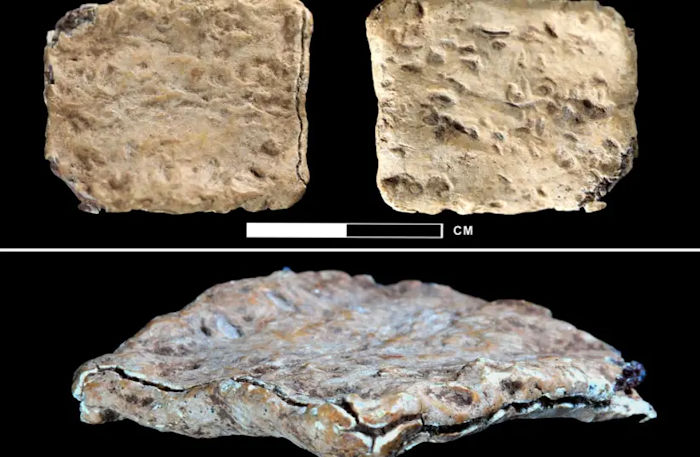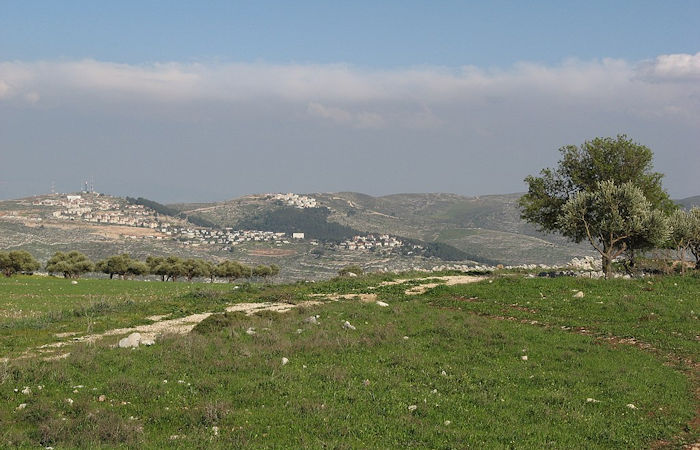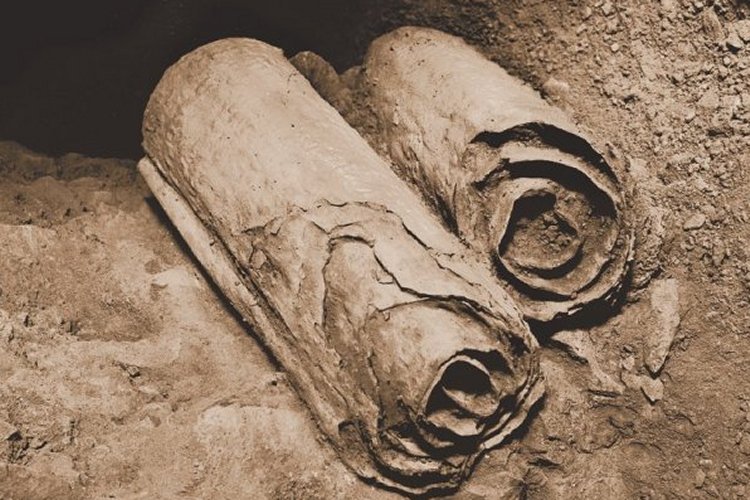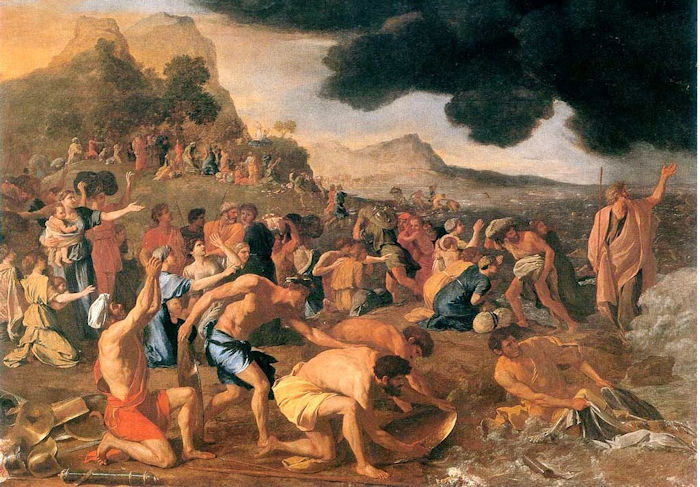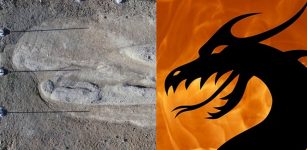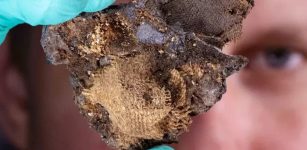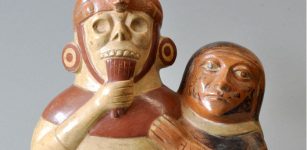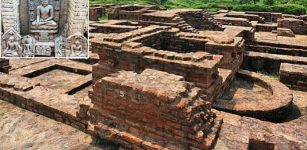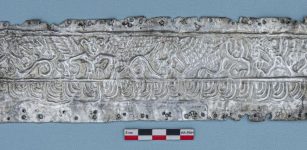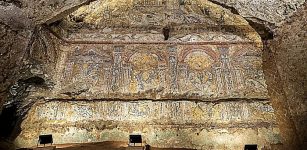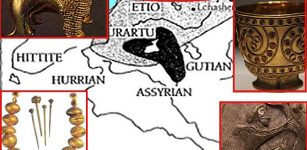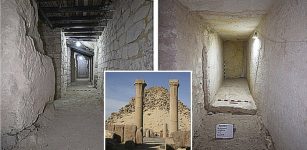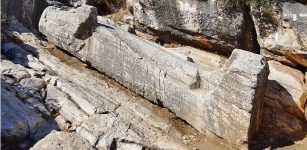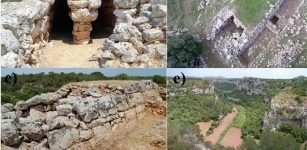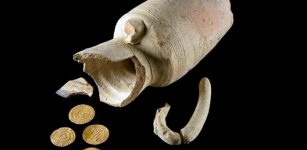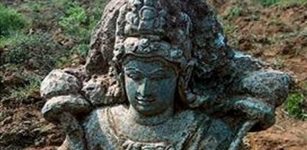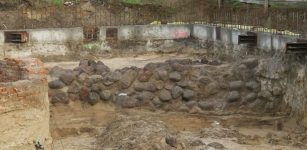Rare ‘Cursed’ Tablet Predating The Dead Sea Scrolls Discovered On Mount Ebal Could Re-Write History – Scientists Say
Conny Waters - AncientPages.com - Scientists have announced the discovery of a rare ancient tablet that has the potential to re-write history.
The tiny tablet is older than the Dead Sea Scrolls and was unearthed on Mount Ebla in Israel. Measuring only two centimeters by two centimeters in size, the engraving on the tablet has now been translated and researchers argue the engraving could offer proof that the events of the Bible occurred hundreds of years earlier than previously believed.
This lead curse tablet, discovered in Israel, is the oldest known Hebrew text. Credit: Michael C. Luddeni
The Ancient Tablet Is Similar To The Defixiones
The small ancient lead tablet was discovered by Dr. Scott Stripling, director of the Archaeological Studies Institute at The Bible Seminary in Katy who together with her team visited Mount Ebal, one of the two mountains in the immediate vicinity of the city of Nablus in the West Bank, and forms the northern side of the valley in which Nablus is situated, the southern side being formed by Mount Gerizim.
The unearthed tablet reminds of the ancient Roman defixiones that were deliberately produced to curse people.
The inscription on the discovered tablet reads: “Cursed, cursed, cursed — cursed by the God Yahweh. You will die cursed. Cursed you will surely die. Cursed by Yahweh — cursed, cursed, cursed.”
Examinations of the artifact suggest the tablet is at least 200 years older than any other Hebrew text in existence.
The Dead Sea Scrolls are considered the defining artifact that determines the timeline of the Bible. The scrolls were written about 150 B.C. Some historians argue that the Exodus, the Israelites’ flight from Egypt, occurred somewhere between 600 B.C. and 300 B.C. during what are known as the Persian period and Hellenistic period, respectively.
The timeline of the Bible has long been based on the Dead Sea Scrolls that were discovered in 1947 West Jordan, near the ruins of Qumran. At the site, researchers found clay pots filled with ancient scrolls. The artifacts were scattered across eleven caves, located 13 miles east of Jerusalem, Israel.
The texts are written using a carbon-based ink and are mostly in Hebrew, with some in Aramaic (a Semitic language, allegedly spoken by Jesus) and in Greek. As reported earlier on AncientPages.com, “the preliminary analysis showed the texts belonged to the Essenes, member of a religious sect or brotherhood that flourished in Palestine from about the 2nd century BC to the end of the 1st century AD.
View of Mount Ebal. Credit: Someone35 - CC BY-SA 3.0
However, a later review of these results has raised additional questions related to the scrolls, considered one of the greatest archaeological events of the twentieth century.
“The tablet was folded in half, so in order to read the text without destroying it, Stripling formed a collaboration with four scientists from the Academy of Sciences of the Czech Republic and two epigraphers to read the text, the Houston Chronicle reports.
Can The Tablet Offer Evidence The Biblical Exodus Happened Much Earlier?
The date of the Biblical Exodus remains a matter of debate. Some historians argue that the Exodus, the Israelites’ flight from Egypt, occurred somewhere between 600 B.C. and 300 B.C. during what are known as the Persian period and Hellenistic period, respectively.
“One can no longer argue with a straight face that the biblical text was not written until the Persian period or the Hellenistic period as many higher critics have done, when here we do clearly have the ability to write the entire text at a much, much earlier date,” Dr. Stripling said.
“This tips the scale in favor of an earlier date and does not help the arguments of those who favor a later date,” Stripling noted.
It’s the use of the word “Yahweh” that throws off the original Biblical timeline, Stripling said. If a tablet of that age was found in Israel, it means the Israelites had already fled Egypt and been established in Israel earlier than originally thought.
“We now have the name ‘Yahweh,’ the biblical God of Israel, in an inscription dating from (Late Bronze Era II), which is earlier than many skeptics would argue that the Bible existed or that there was even the ability to write down a sacred text,” he said.
The Dead Sea Scrolls. Credit Public Domain
According to Dr. Gershon Galil, a professor of biblical studies from the University of Haifa, the author of the ancient Mount Ebla tablet was probably a highly educated male religious leader.
“It is clear that the person who wrote this was a genius,” Galil noted. “He was not only a scribe, he was a theologian. He was a leader.”
The curse was probably directed back at the author as a reminder to himself of God’s wrath should he fail to submit to the will of God, Stripling added.
Crossing of the Red Sea, Nicolas Poussin. Credit: Public Domain
The author most likely used an iron stylus to scratch the words into the lead, Stripling explained, which was a common method of inscription at the time.
“In the oldest book in the Bible, in Job 19:24, there’s a reference to inscribing with an iron pin on lead,” he noted.
Mount Ebal was known in the biblical books Joshua and Deuteronomy as “the mountain of curse,” so it was logical that the text would have been found on the mountain, said Galil.
An academic, peer-reviewed article on the archaeological find is in process and is expected to be published later in 2022.
Written by Conny Waters - AncientPages.com Staff Writer

